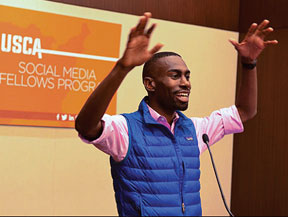 2015 USCA Newsmaker DeRay Mckesson, Black Lives Matter activist, compares fighting AIDS to protest over policing
2015 USCA Newsmaker DeRay Mckesson, Black Lives Matter activist, compares fighting AIDS to protest over policing
DeRay Mckesson, a member of the organization We The Protesters, speaks on HIV at the opening session of USCA 2015
AIDS activists fighting to end the epidemic in the Black community can take cues from the protests over police violence and the killing of unarmed Black men, says DeRay Mckesson, a prominent leader associated with the Black Lives Matter movement.
Mckesson, who is also a planning team member of “We The Protesters,” talked to a group of journalists who specialize in social media during the 2015 United States Conference on AIDS, shortly after delivering remarks during a plenary on the Black Lives Matter movement. The Wisconsin native was one of the activists who garnered a huge social media following for his first-hand reporting from the protests in Ferguson, Mo., over the August 2014 shooting death of Michael Brown, an unarmed Black teenager, by former police officer Darren Wilson.
A conversation about the HIV/AIDS epidemic can be an extension of the dialogue on Black identity that evolved as an “unintentional good consequence” of the protests over plicing in the Black community, explained Mckesson, and ativists should use social media as a tool to spark those conversations.
“There’s this interesting space in social media that allows us to build community differently,” said Mckesson. “It wasn’t until there was this unrest in Ferguson that people started talking” over social media about police violence in their own communities.
Mckesson said that one of the ways that activists can combat stigma is by normalizing the fact that people have a range of experiences. They should also look for platforms to share their own stories.
“The failure of the media is the reason why we got a lot of exposure,” said Mckesson. “CNN wasn’t telling our story in the beginning, so we had to tell it,” said Mckesson.
McKesson recounted an episode during a street protest in St. Louis, Mo., after Vonderrit Myers, a Black teenager was shot and killed by an off-duty police officer in October 2014. Witnesses to the shooting said that Myers was only carrying a sandwich, while police reported that they found a 9mm Ruger and shell casings at the scene.
During a chaotic standoff, one of the protesters yelled, “you faggot!” at the menacing line of police. When one of his fellow protesters admonished him over the homophobic slur, he apologized.
“There was this really small moment in the movement space where people were there confronting homophobia,” said Mckesson. “Those two people never would have been in any space together before where they could have had that exchange and to see that on one of the wildest nights in St. Louis City is something that I will never forget.”
“I don’t think that people did it intentionally, but all of a sudden, this idea about the complexities of Black identity became really present,” said Mckesson. “In St. Louis, it was about homophobia. In other cities it was about transgender identity and I think there’s an opportunity for the conversation about HIV/AIDS to be an extension of that. All of a sudden people were talking about all of these things in Blackness that people weren’t talking about before.”
Although disparities in education, poverty and health care are all important, Mckesson acknowledged that those issues didn’t get people in the streets and keep people in the streets the way that police violence did.
“I only know movement work from what I’ve read,” said Mckesson. “I can look at the Civil Rights Movement, but I don’t know what it felt like to win in that moment.”
Mckesson said that from a strategic standpoint policing can be a place to get wins and have people experience wins before expanding to other issues, instead of expanding and having cool conversations, but not getting any wins.
Mckesson continued: “The protesters need to ask for something and get that so people can see that and then go do it, and policing is the way to do that.”
Freddie Allen is the Senior Washington Correspondent for Black Press of America. You can follow him on Twitter @freddieallenjr.
